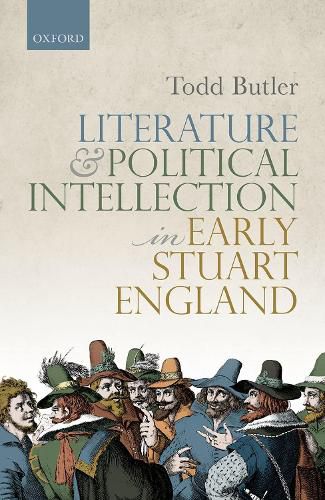Readings Newsletter
Become a Readings Member to make your shopping experience even easier.
Sign in or sign up for free!
You’re not far away from qualifying for FREE standard shipping within Australia
You’ve qualified for FREE standard shipping within Australia
The cart is loading…






Drawing upon a myriad of literary and political texts, Literature and Political Intellection in Early Stuart England charts how some of the Stuart period’s major challenges to governance–the equivocation of recusant Catholics, the parsing of one’s civil and religious obligations, the composition and distribution of subversive texts, and the increasing assertiveness of Parliament–evoked much greater disputes about the mental processes by which monarchs and subjects alike imagined, understood, and effected political action. Rather than emphasizing particular forms of political thought such as republicanism or absolutism, Todd Butler here investigates the more foundational question of political intellection, or the various ways that early modern individuals thought through the often uncertain political and religious environment they occupied, and how attention to such thinking in oneself or others could itself constitute a political position. Focusing on this continuing immanence of cognitive processes in the literature of the Stuart era, Butler examines how writers such as Francis Bacon, John Donne, Philip Massinger, John Milton, and other less familiar figures of the seventeenth-century evidence a shared concern with the interrelationship between mental and political behavior. These analyses are combined with similarly close readings of religious and political affairs that similarly return our attention to how early Stuart writers of all sorts understood the relationship between mental states and the forms of political engagement such as speech, oaths, debate, and letter-writing that expressed them. What results is a revised framework for early modern political subjectivity, one in which claims to liberty and sovereignty are tied not simply to what one can do but how–or even if–one can freely think.
$9.00 standard shipping within Australia
FREE standard shipping within Australia for orders over $100.00
Express & International shipping calculated at checkout
Drawing upon a myriad of literary and political texts, Literature and Political Intellection in Early Stuart England charts how some of the Stuart period’s major challenges to governance–the equivocation of recusant Catholics, the parsing of one’s civil and religious obligations, the composition and distribution of subversive texts, and the increasing assertiveness of Parliament–evoked much greater disputes about the mental processes by which monarchs and subjects alike imagined, understood, and effected political action. Rather than emphasizing particular forms of political thought such as republicanism or absolutism, Todd Butler here investigates the more foundational question of political intellection, or the various ways that early modern individuals thought through the often uncertain political and religious environment they occupied, and how attention to such thinking in oneself or others could itself constitute a political position. Focusing on this continuing immanence of cognitive processes in the literature of the Stuart era, Butler examines how writers such as Francis Bacon, John Donne, Philip Massinger, John Milton, and other less familiar figures of the seventeenth-century evidence a shared concern with the interrelationship between mental and political behavior. These analyses are combined with similarly close readings of religious and political affairs that similarly return our attention to how early Stuart writers of all sorts understood the relationship between mental states and the forms of political engagement such as speech, oaths, debate, and letter-writing that expressed them. What results is a revised framework for early modern political subjectivity, one in which claims to liberty and sovereignty are tied not simply to what one can do but how–or even if–one can freely think.